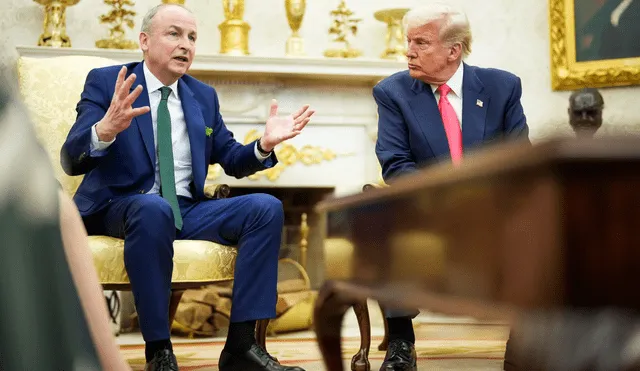Trump threatens tariffs on Ireland over tax policies in meeting with PM Micheál Martin
Trump criticizes Ireland’s tax policies, proposing tariffs to counter the trade deficit, while PM Martin defends Irish investments in the U.S. The meeting took place amid rising U.S.-EU trade tensions, sparking economic concerns. Both leaders aimed to maintain diplomacy, but uncertainty over future trade relations remains.

During a White House meeting with Irish Prime Minister Micheál Martin, President Donald Trump criticized Ireland’s tax policies, arguing they have attracted American companies and worsened the trade deficit. He expressed concerns over what he called a "massive" trade imbalance, blaming Ireland’s low corporate tax rates. Trump suggested imposing tariffs to counteract this economic disparity. He specifically mentioned a 200% tariff on pharmaceutical imports from Ireland. The meeting, intended to celebrate U.S.-Ireland relations, took a more contentious turn. Despite this, both leaders attempted to maintain a diplomatic tone.
Trump emphasized that the U.S. has been losing revenue due to companies relocating to Ireland. He claimed that American businesses are unfairly incentivized to move abroad. According to Trump, tariffs could help bring back jobs and economic benefits to the U.S. He also stated that other European nations have taken advantage of American trade policies. The president suggested that more aggressive economic strategies were necessary. His remarks sparked concerns among business leaders and economic analysts.

ALSO SEE: Loma Linda University Children's Hospital faces lockdown amid reports of armed suspect on premises
Ireland’s economic role in U.S. trade: Martin defends investments amid tariff concerns
Prime Minister Martin countered Trump’s claims by highlighting Ireland’s economic contributions. He stressed that Irish companies invest billions in the U.S. each year. Martin also pointed out that Ireland serves as an important gateway for American businesses into the European market. He urged Trump to consider the broader benefits of U.S.-Ireland trade. The Irish leader expressed concerns that tariffs could harm both economies. Despite differences, he reiterated Ireland’s commitment to a strong partnership with the U.S.
The meeting took place as part of the annual St. Patrick’s Day celebrations. Traditionally, this event is an opportunity to reinforce diplomatic and cultural ties. However, trade tensions cast a shadow over the discussions this year. Trump and Martin still participated in symbolic gestures, including the Shamrock Bowl presentation. This moment served as a reminder of the deep historical connection between the two nations. Nevertheless, economic disputes remained a key point of contention.
U.S.-EU trade tensions: how tariffs could impact Ireland and global markets
The timing of Trump’s statements is significant, given rising trade disputes with the European Union. The EU recently announced $28 billion in retaliatory tariffs on U.S. goods. These measures were introduced in response to American tariffs on steel and aluminum. As an EU member, Ireland could be significantly impacted by these policies. Economists warn that escalating trade disputes could lead to economic uncertainty. The global market is watching closely as tensions continue to build.
The future of U.S.-Ireland trade relations remains uncertain. Trump’s focus on reducing trade deficits suggests more protectionist policies ahead. If tariffs are imposed, they could disrupt industries that rely on transatlantic trade. Both American and Irish businesses may face higher costs and operational challenges. Martin hopes to resolve disputes through dialogue and negotiation. However, with the upcoming U.S. elections, political shifts could further influence trade policy. The long-term impact of these discussions is yet to be determined.











